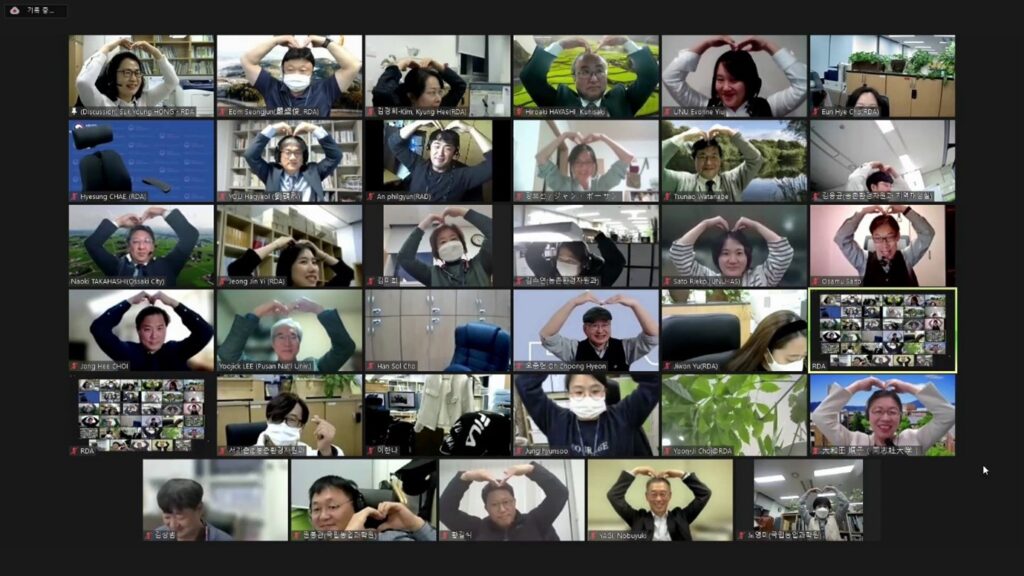The United Nations University Institute for the Advanced Study of Sustainability Operating Unit Ishikawa Kanazawa (UNU-IAS OUIK), in partnership with the Rural Development Administration (RDA) of the Republic of Korea, held a symposium, Conservation and Strengthening the Value of Agricultural Heritage Systems in the New Normal Era, on 5 November 2021. With the transition into the post-COVID-19 ‘new normal’ as the main through-thread, the event aimed to: 1) find ways to sustainably conserve agricultural heritage and strengthen its value in accordance with the changing times; and 2) share best practices and directions for the conservation and management of Globally Important Agricultural Heritage System (GIAHS).
Following the welcome remarks by Mr. Taewoong Hur, Administrator of the RDA, Dr. Tsunao Watanabe, Director of UNU-IAS OUIK, framed the event by reminding the audience of the very premise of GIAHS that was showcased again by the COVID-19 pandemic: humans and nature together constitute a single, unified system worthy of conservation and sustenance. Professor Nobuyuki Yagi from the University of Tokyo illustrated how this messaging is reinforced through the Food and Agriculture Organization’s (FAO) GIAHS application review process, which requires an explicit articulation of the ways in which people and the environment interdepend and thrive through their coexistence. In response to these introductory presentations, Mr. Jaerok Ahn from the Ministry of Agriculture, Food, and Rural Affairs (MAFRA) noted the agency’s ongoing efforts to conserve current agricultural heritage systems and identify more, as a way of strengthening the overall livelihood of agricultural communities and environmental protection measures.
Subsequent presentations and discussion elaborated on how GIAHS in the ‘new normal’ times could be more widely recognized for the multi-faceted value-add it brings to local communities, society, and humanity. Dr. Evonne Yiu from UNU-IAS OUIK and Dr. Daeyong Hwang from RDA emphasized the importance of monitoring and evaluating the conservation outcomes of GIAHS and shared the efforts to identify practical metrics and indicators unfolding under the ‘Introduction of Technologies on Characteristic Analysis and Conservation Management in Agricultural Heritage Systems’ project, a collaborative research between UNU-IAS OUIK and RDA. Dr. Myeongchul Jeong from RDA reiterated the importance of monitoring by presenting on the recently launched participatory monitoring initiative among agricultural heritage systems in Korea. Dr. Seok-young Hong from RDA and Dr. Tsunao Watanabe built on the presentations by pointing out the importance of ensuring that monitoring is made practical, to the extent that it can engage non-traditional stakeholders, such as young people in the community, as promoted by the GIAHS Youth Summit: GIAHS for the Future and to the World.
Grounding the conversation with real-life examples of current practices and future plans from their respective sites were Dr. Hiroyaki Hayashi (Chairman of the Kunisaki Peninsula Usa GIAHS Promotion Association), Naoki Takahashi (Head of Secretariat of the Osaki GIAHS Promotion Association), and Kilsik Hwang (Researcher at Myeongso IMC), who works closely with the communities of the Traditional Gudeuljang Irrigated Rice Terraces in Cheongsando. They stressed the importance of reviving the tourism industry and product sales that have been severely impacted by the pandemic, as well as educating younger generation about agricultural heritage systems, systematically documenting historical knowledge and cultural practices, and creating incentives that attract financial investment. In response, Dr. Osamu Saito from the Institute for Global Environmental Strategies (IGES), Dr. Jong-hee Choi from Pai Chai University, and Dr. Junko Owada from Doshisha University praised the actions on the ground and shared more examples from the field, such as Japanese GIAHS’ proactive pursuit of the Sustainable Development Goals (SDGs).

The Conservation and Strengthening the Value of Agricultural Heritage Systems in the New Normal Era symposium was attended by nearly 120 participants through Zoom and YouTube Korean and Japanese channels.
The symposium closed with deep appreciation for and acknowledgement of the meaningful work to protect GIAHS, as a reminder of the challenges that remain, such as the decline in farming populations and collective dedication to protect the environment for long-term sustainability, beyond the pandemic and into the ‘new normal’ era.
The event was livestreamed on RDA’s YouTube channel in Korean and Japanese, and can be accessed here for Japanese and here for Korean. The full program, inclusive of all presentations, can be downloaded from here (also accessible through the aforementioned YouTube links).




